- Home
- Dante Alighieri
The Vision of Dante Alighiere or Hell, Purgatory and Paradise Page 11
The Vision of Dante Alighiere or Hell, Purgatory and Paradise Read online
Page 11
That on the right hand of our successors
Part of the Christian people should be set,
And part upon their left; nor that the keys,
Which were vouchsaf'd me, should for ensign serve
Unto the banners, that do levy war
On the baptiz'd: nor I, for sigil-mark
Set upon sold and lying privileges;
Which makes me oft to bicker and turn red.
In shepherd's clothing greedy wolves below
Range wide o'er all the pastures. Arm of God!
Why longer sleepst thou? Caorsines and Gascona
Prepare to quaff our blood. O good beginning
To what a vile conclusion must thou stoop!
But the high providence, which did defend
Through Scipio the world's glory unto Rome,
Will not delay its succour: and thou, son,
Who through thy mortal weight shall yet again
Return below, open thy lips, nor hide
What is by me not hidden." As a Hood
Of frozen vapours streams adown the air,
What time the she-goat with her skiey horn
Touches the sun; so saw I there stream wide
The vapours, who with us had linger'd late
And with glad triumph deck th' ethereal cope.
Onward my sight their semblances pursued;
So far pursued, as till the space between
From its reach sever'd them: whereat the guide
Celestial, marking me no more intent
On upward gazing, said, "Look down and see
What circuit thou hast compass'd." From the hour
When I before had cast my view beneath,
All the first region overpast I saw,
Which from the midmost to the bound'ry winds;
That onward thence from Gades I beheld
The unwise passage of Laertes' son,
And hitherward the shore, where thou, Europa!
Mad'st thee a joyful burden: and yet more
Of this dim spot had seen, but that the sun,
A constellation off and more, had ta'en
His progress in the zodiac underneath.
Then by the spirit, that doth never leave
Its amorous dalliance with my lady's looks,
Back with redoubled ardour were mine eyes
Led unto her: and from her radiant smiles,
Whenas I turn'd me, pleasure so divine
Did lighten on me, that whatever bait
Or art or nature in the human flesh,
Or in its limn'd resemblance, can combine
Through greedy eyes to take the soul withal,
Were to her beauty nothing. Its boon influence
From the fair nest of Leda rapt me forth,
And wafted on into the swiftest heav'n.
What place for entrance Beatrice chose,
I may not say, so uniform was all,
Liveliest and loftiest. She my secret wish
Divin'd; and with such gladness, that God's love
Seem'd from her visage shining, thus began:
"Here is the goal, whence motion on his race
Starts; motionless the centre, and the rest
All mov'd around. Except the soul divine,
Place in this heav'n is none, the soul divine,
Wherein the love, which ruleth o'er its orb,
Is kindled, and the virtue that it sheds;
One circle, light and love, enclasping it,
As this doth clasp the others; and to Him,
Who draws the bound, its limit only known.
Measur'd itself by none, it doth divide
Motion to all, counted unto them forth,
As by the fifth or half ye count forth ten.
The vase, wherein time's roots are plung'd, thou seest,
Look elsewhere for the leaves. O mortal lust!
That canst not lift thy head above the waves
Which whelm and sink thee down! The will in man
Bears goodly blossoms; but its ruddy promise
Is, by the dripping of perpetual rain,
Made mere abortion: faith and innocence
Are met with but in babes, each taking leave
Ere cheeks with down are sprinkled; he, that fasts,
While yet a stammerer, with his tongue let loose
Gluts every food alike in every moon.
One yet a babbler, loves and listens to
His mother; but no sooner hath free use
Of speech, than he doth wish her in her grave.
So suddenly doth the fair child of him,
Whose welcome is the morn and eve his parting,
To negro blackness change her virgin white.
"Thou, to abate thy wonder, note that none
Bears rule in earth, and its frail family
Are therefore wand'rers. Yet before the date,
When through the hundredth in his reck'ning drops
Pale January must be shor'd aside
From winter's calendar, these heav'nly spheres
Shall roar so loud, that fortune shall be fain
To turn the poop, where she hath now the prow;
So that the fleet run onward; and true fruit,
Expected long, shall crown at last the bloom!"
CANTO XXVIII
So she who doth imparadise my soul,
Had drawn the veil from off our pleasant life,
And bar'd the truth of poor mortality;
When lo! as one who, in a mirror, spies
The shining of a flambeau at his back,
Lit sudden ore he deem of its approach,
And turneth to resolve him, if the glass
Have told him true, and sees the record faithful
As note is to its metre; even thus,
I well remember, did befall to me,
Looking upon the beauteous eyes, whence love
Had made the leash to take me. As I turn'd;
And that, which, in their circles, none who spies,
Can miss of, in itself apparent, struck
On mine; a point I saw, that darted light
So sharp, no lid, unclosing, may bear up
Against its keenness. The least star we view
From hence, had seem'd a moon, set by its side,
As star by side of star. And so far off,
Perchance, as is the halo from the light
Which paints it, when most dense the vapour spreads,
There wheel'd about the point a circle of fire,
More rapid than the motion, which first girds
The world. Then, circle after circle, round
Enring'd each other; till the seventh reach'd
Circumference so ample, that its bow,
Within the span of Juno's messenger,
lied scarce been held entire. Beyond the sev'nth,
Follow'd yet other two. And every one,
As more in number distant from the first,
Was tardier in motion; and that glow'd
With flame most pure, that to the sparkle' of truth
Was nearest, as partaking most, methinks,
Of its reality. The guide belov'd
Saw me in anxious thought suspense, and spake:
"Heav'n, and all nature, hangs upon that point.
The circle thereto most conjoin'd observe;
And know, that by intenser love its course
Is to this swiftness wing'd. "To whom I thus:
"It were enough; nor should I further seek,
Had I but witness'd order, in the world
Appointed, such as in these wheels is seen.
But in the sensible world such diff'rence is,
That is each round shows more divinity,
As each is wider from the centre. Hence,
If in this wondrous and angelic temple,
That hath for confine only light and love,
My wish may have completion I must know,
Wherefor
e such disagreement is between
Th' exemplar and its copy: for myself,
Contemplating, I fail to pierce the cause."
"It is no marvel, if thy fingers foil'd
Do leave the knot untied: so hard 't is grown
For want of tenting." Thus she said: "But take,"
She added, "if thou wish thy cure, my words,
And entertain them subtly. Every orb
Corporeal, doth proportion its extent
Unto the virtue through its parts diffus'd.
The greater blessedness preserves the more.
The greater is the body (if all parts
Share equally) the more is to preserve.
Therefore the circle, whose swift course enwheels
The universal frame answers to that,
Which is supreme in knowledge and in love
Thus by the virtue, not the seeming, breadth
Of substance, measure, thou shalt see the heav'ns,
Each to the' intelligence that ruleth it,
Greater to more, and smaller unto less,
Suited in strict and wondrous harmony."
As when the sturdy north blows from his cheek
A blast, that scours the sky, forthwith our air,
Clear'd of the rack, that hung on it before,
Glitters; and, With his beauties all unveil'd,
The firmament looks forth serene, and smiles;
Such was my cheer, when Beatrice drove
With clear reply the shadows back, and truth
Was manifested, as a star in heaven.
And when the words were ended, not unlike
To iron in the furnace, every cirque
Ebullient shot forth scintillating fires:
And every sparkle shivering to new blaze,
In number did outmillion the account
Reduplicate upon the chequer'd board.
Then heard I echoing on from choir to choir,
"Hosanna," to the fixed point, that holds,
And shall for ever hold them to their place,
From everlasting, irremovable.
Musing awhile I stood: and she, who saw
by inward meditations, thus began:
"In the first circles, they, whom thou beheldst,
Are seraphim and cherubim. Thus swift
Follow their hoops, in likeness to the point,
Near as they can, approaching; and they can
The more, the loftier their vision. Those,
That round them fleet, gazing the Godhead next,
Are thrones; in whom the first trine ends. And all
Are blessed, even as their sight descends
Deeper into the truth, wherein rest is
For every mind. Thus happiness hath root
In seeing, not in loving, which of sight
Is aftergrowth. And of the seeing such
The meed, as unto each in due degree
Grace and good-will their measure have assign'd.
The other trine, that with still opening buds
In this eternal springtide blossom fair,
Fearless of bruising from the nightly ram,
Breathe up in warbled melodies threefold
Hosannas blending ever, from the three
Transmitted. hierarchy of gods, for aye
Rejoicing, dominations first, next then
Virtues, and powers the third. The next to whom
Are princedoms and archangels, with glad round
To tread their festal ring; and last the band
Angelical, disporting in their sphere.
All, as they circle in their orders, look
Aloft, and downward with such sway prevail,
That all with mutual impulse tend to God.
These once a mortal view beheld. Desire
In Dionysius so intently wrought,
That he, as I have done rang'd them; and nam'd
Their orders, marshal'd in his thought. From him
Dissentient, one refus'd his sacred read.
But soon as in this heav'n his doubting eyes
Were open'd, Gregory at his error smil'd
Nor marvel, that a denizen of earth
Should scan such secret truth; for he had learnt
Both this and much beside of these our orbs,
From an eye-witness to heav'n's mysteries."
CANTO XXIX
No longer than what time Latona's twins
Cover'd of Libra and the fleecy star,
Together both, girding the' horizon hang,
In even balance from the zenith pois'd,
Till from that verge, each, changing hemisphere,
Part the nice level; e'en so brief a space
Did Beatrice's silence hold. A smile
Bat painted on her cheek; and her fix'd gaze
Bent on the point, at which my vision fail'd:
When thus her words resuming she began:
"I speak, nor what thou wouldst inquire demand;
For I have mark'd it, where all time and place
Are present. Not for increase to himself
Of good, which may not be increas'd, but forth
To manifest his glory by its beams,
Inhabiting his own eternity,
Beyond time's limit or what bound soe'er
To circumscribe his being, as he will'd,
Into new natures, like unto himself,
Eternal Love unfolded. Nor before,
As if in dull inaction torpid lay.
For not in process of before or aft
Upon these waters mov'd the Spirit of God.
Simple and mix'd, both form and substance, forth
To perfect being started, like three darts
Shot from a bow three-corded. And as ray
In crystal, glass, and amber, shines entire,
E'en at the moment of its issuing; thus
Did, from th' eternal Sovran, beam entire
His threefold operation, at one act
Produc'd coeval. Yet in order each
Created his due station knew: those highest,
Who pure intelligence were made: mere power
The lowest: in the midst, bound with strict league,
Intelligence and power, unsever'd bond.
Long tract of ages by the angels past,
Ere the creating of another world,
Describ'd on Jerome's pages thou hast seen.
But that what I disclose to thee is true,
Those penmen, whom the Holy Spirit mov'd
In many a passage of their sacred book
Attest; as thou by diligent search shalt find
And reason in some sort discerns the same,
Who scarce would grant the heav'nly ministers
Of their perfection void, so long a space.
Thus when and where these spirits of love were made,
Thou know'st, and how: and knowing hast allay'd
Thy thirst, which from the triple question rose.
Ere one had reckon'd twenty, e'en so soon
Part of the angels fell: and in their fall
Confusion to your elements ensued.
The others kept their station: and this task,
Whereon thou lookst, began with such delight,
That they surcease not ever, day nor night,
Their circling. Of that fatal lapse the cause
Was the curst pride of him, whom thou hast seen
Pent with the world's incumbrance. Those, whom here
Thou seest, were lowly to confess themselves
Of his free bounty, who had made them apt
For ministries so high: therefore their views
Were by enlight'ning grace and their own merit
Exalted; so that in their will confirm'd
They stand, nor feel to fall. For do not doubt,
But to receive the grace, which heav'n vouchsafes,
Is meritorious, even as the soul
With prompt affecti
on welcometh the guest.
Now, without further help, if with good heed
My words thy mind have treasur'd, thou henceforth
This consistory round about mayst scan,
And gaze thy fill. But since thou hast on earth
Heard vain disputers, reasoners in the schools,
Canvas the' angelic nature, and dispute
Its powers of apprehension, memory, choice;
Therefore, 't is well thou take from me the truth,
Pure and without disguise, which they below,
Equivocating, darken and perplex.
"Know thou, that, from the first, these substances,
Rejoicing in the countenance of God,
Have held unceasingly their view, intent
Upon the glorious vision, from the which
Naught absent is nor hid: where then no change
Of newness with succession interrupts,
Remembrance there needs none to gather up
Divided thought and images remote
"So that men, thus at variance with the truth
Dream, though their eyes be open; reckless some
Of error; others well aware they err,
To whom more guilt and shame are justly due.
Each the known track of sage philosophy
Deserts, and has a byway of his own:
So much the restless eagerness to shine
And love of singularity prevail.
Yet this, offensive as it is, provokes
Heav'n's anger less, than when the book of God
Is forc'd to yield to man's authority,
Or from its straightness warp'd: no reck'ning made
What blood the sowing of it in the world
Has cost; what favour for himself he wins,
Who meekly clings to it. The aim of all
Is how to shine: e'en they, whose office is
To preach the Gospel, let the gospel sleep,
And pass their own inventions off instead.
One tells, how at Christ's suffering the wan moon
Bent back her steps, and shadow'd o'er the sun
With intervenient disk, as she withdrew:
Another, how the light shrouded itself
Within its tabernacle, and left dark
The Spaniard and the Indian, with the Jew.
Such fables Florence in her pulpit hears,
Bandied about more frequent, than the names
Of Bindi and of Lapi in her streets.
The sheep, meanwhile, poor witless ones, return
From pasture, fed with wind: and what avails
For their excuse, they do not see their harm?
Christ said not to his first conventicle,
'Go forth and preach impostures to the world,'
But gave them truth to build on; and the sound
Was mighty on their lips; nor needed they,
Beside the gospel, other spear or shield,
To aid them in their warfare for the faith.
The preacher now provides himself with store
Of jests and gibes; and, so there be no lack
Of laughter, while he vents them, his big cowl
Distends, and he has won the meed he sought:
Could but the vulgar catch a glimpse the while
Of that dark bird which nestles in his hood,
They scarce would wait to hear the blessing said.
Which now the dotards hold in such esteem,
That every counterfeit, who spreads abroad
The hands of holy promise, finds a throng
Of credulous fools beneath. Saint Anthony
Fattens with this his swine, and others worse
Than swine, who diet at his lazy board,
Paying with unstamp'd metal for their fare.
"But (for we far have wander'd) let us seek
The forward path again; so as the way
Be shorten'd with the time. No mortal tongue
Nor thought of man hath ever reach'd so far,
That of these natures he might count the tribes.
What Daniel of their thousands hath reveal'd
With finite number infinite conceals.
The fountain at whose source these drink their beams,
With light supplies them in as many modes,
As there are splendours, that it shines on: each
According to the virtue it conceives,
Differing in love and sweet affection.
Look then how lofty and how huge in breadth
The' eternal might, which, broken and dispers'd
Over such countless mirrors, yet remains
Whole in itself and one, as at the first."
CANTO XXX
Noon's fervid hour perchance six thousand miles
From hence is distant; and the shadowy cone
Almost to level on our earth declines;
When from the midmost of this blue abyss
By turns some star is to our vision lost.
And straightway as the handmaid of the sun
Puts forth her radiant brow, all, light by light,
Fade, and the spangled firmament shuts in,
E'en to the loveliest of the glittering throng.
Thus vanish'd gradually from my sight
The triumph, which plays ever round the point,
That overcame me, seeming (for it did)
Engirt by that it girdeth. Wherefore love,
With loss of other object, forc'd me bend
Mine eyes on Beatrice once again.
If all, that hitherto is told of her,
Were in one praise concluded, 't were too weak
To furnish out this turn. Mine eyes did look
On beauty, such, as I believe in sooth,
Not merely to exceed our human, but,
That save its Maker, none can to the full
Enjoy it. At this point o'erpower'd I fail,

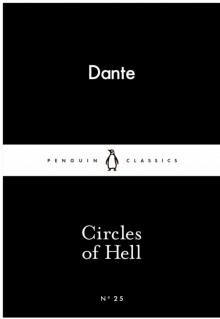 Circles of Hell
Circles of Hell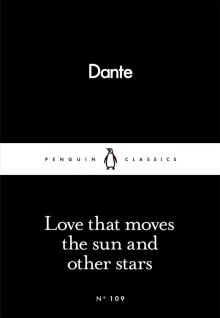 Love That Moves the Sun and Other Stars
Love That Moves the Sun and Other Stars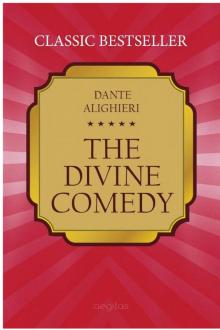 The Divine Comedy
The Divine Comedy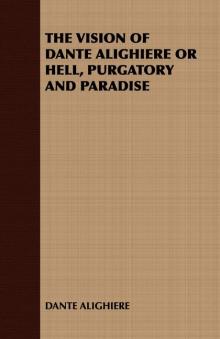 The Vision of Dante Alighiere or Hell, Purgatory and Paradise
The Vision of Dante Alighiere or Hell, Purgatory and Paradise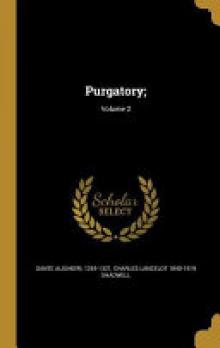 Purgatory
Purgatory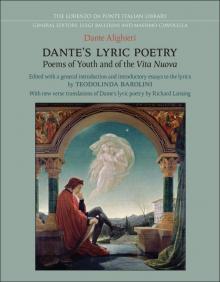 Dante's Lyric Poems (Italian Poetry in Translation)
Dante's Lyric Poems (Italian Poetry in Translation)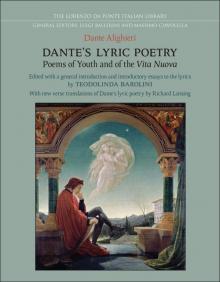 Dante's Lyric Poetry: Poems of Youth and of the 'Vita Nuova'
Dante's Lyric Poetry: Poems of Youth and of the 'Vita Nuova'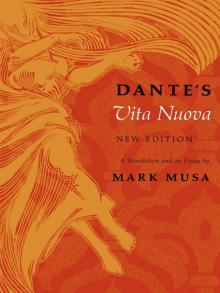 Dante’s Vita Nuova, New Edition: A Translation and an Essay
Dante’s Vita Nuova, New Edition: A Translation and an Essay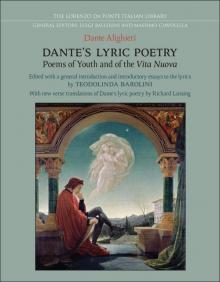 Dante's Lyric Poetry
Dante's Lyric Poetry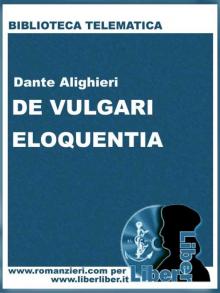 De vulgari eloquentia
De vulgari eloquentia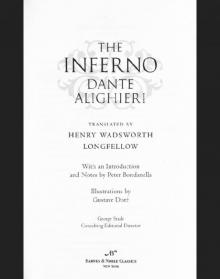 The Inferno (Barnes & Noble Classics Series)
The Inferno (Barnes & Noble Classics Series)